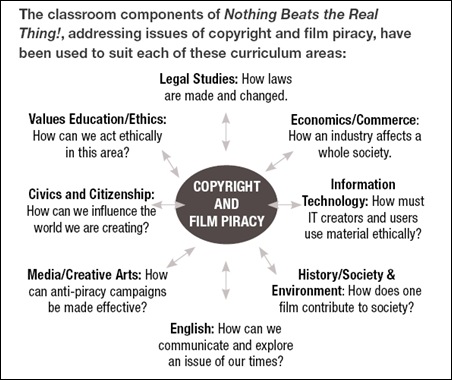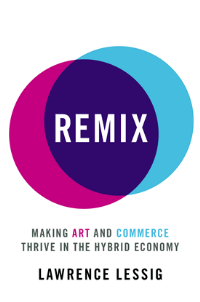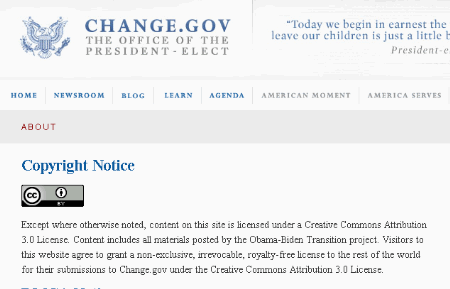Home » creative commons (Page 6)
Category Archives: creative commons
Obama’s Change includes embracing the Creative Commons
While Obama’s policies were very much pro-Net Neutrality and open access during the campaign, it has taken a little while to see these policies in action (although, to be fair, he’s not actually President yet). Today, though, an important step: Obama’s transition website, change.gov is now licensed under a Creative Commons Attribution license, meaning the information can be shared, reused and repurposed by pretty much anyone, as long as they note where the information came from. Here’s a capture of the website’s copyright notice:
Admittedly there was some confusion because all official federal government websites in the US are supposedly in the public domain, but is a president-elect bound by these rules? The answer seems ambiguous, but the CC BY license, apart from requiring attribution, is pretty much as good as the public domain anyway. Creative Commons heavyweights Lawrence Lessig, Joi Ito and Cory Doctorow have all expressed their delight at seeing Obama’s transition online presence sporting a CC license. I’m delighted, too, and can’t help but think that it would be marvellous to see more of Australia’s government websites and documents under Creative Commons licenses, too! And since Kevin Rudd has styled his own online presence on Obama’s, perhaps his information sharing policies could follow suit rather than being misdirected by this ridiculous internet filtering regime.
AFACT vs iiNet (and convincing Australia’s teenagers they’re pirates)

As most people in Australia would now be aware, one of the most important developments in terms of civil rights and the Australian internet has now gone before the courts as a consortium, led by the Australian Federation Against Copyright Theft (AFACT) is suing ISP iiNet for refusing to cut off customers for alleged (not proven!) copyright infringement in terms of bittorent media downloads. From the Age:
The Australian film and television industry has launched a major legal action against one of Australia’s largest internet service providers for allegedly allowing its users to download pirated movies and TV shows. The action against iiNet was filed in the Federal Court today by Village Roadshow, Universal Pictures, Warner Bros, Paramount Pictures, Sony Pictures Entertainment, 20th Century Fox, Disney and the Seven Network. Mark White, iiNet’s chief operating officer, said the company did not support piracy in any form but it could not disconnect customers just because the movie industry claimed they engaged in illegal downloading. Adrianne Pecotic, executive director of the Australian Federation Against Copyright Theft (AFACT), said the action followed a five-month investigation by the industry.
There are also arguments made that peer to peer networks should simply be blocked (although that argument hasn’t been in quit those terms just yet in this case) but that serves as a good opportunity to remember that p2p and, yes, even bittorent, are not intrinsically for distribution of ‘pirated’ media; there are plenty of things, including feature films, being distributed via peer to peer networks which are entirely legal!
One thing this case should, hopefully, achieve, is to test the extent to which recently imported ‘safe harbour’ provisions actually stand up in an Australian court:
"This is a very important test case for the internet industry in Australia," said Peter Coroneos, chief executive of the Internet Industry Association. "It will test the effect of the safe harbour provisions that were introduced with the US free trade agreement, which provides immunity for ISPs in certain circumstances such as transmission, hosting, caching and referencing activities."
However, as this article from Michael Sainsbury and Fran Foo in Australian IT notes, the lawsuit seems to stand on pretty thin legal grounds (disclaimer: I ain’t no lawyer!):
iiNet managing director Michael Malone said when it received AFACT’s complaints, they were forwarded to the Police. "But AFACT refused to talk to the Police," Mr Malone said. Ms Pecotic brushed aside Mr Malone’s explanation, saying: "The law is clear and iiNet knows that. They cannot pass the buck … it is their responsibility." "There were many things that iiNet could have done and at the very least, issue a warning to the customers involved but they did nothing," she said. Unlike a number of other major jurisdictions such as the United States and Britain, Australia does not have blanket agreement between content companies and broadband providers about file swapping. An Optus spokesperson said that under Australian law there are remedies available to copyright holders, including taking action directly against those alleged to be infringing rights. "It is unfortunate that the rights holders are targeting an ISP because under Australian law, internet service providers may generally be considered conduits which provide carriage services, and as such are not responsible for copyright infringements carried out by customers using their internet services,” the spokesperson said. This position is reflected in sections 39 (B) and 112 (E) of the Copyright Act 1968 (Com), and in the safe harbours set out in Division 2AA, which were introduced protect ISPs from being onerously required to enforce intellectual property rights where they are merely providing carriage services.
On the smaller screen front, TV Tonight notes that Channel 7 is part of the group attacking iiNet, although reading the comments on the TV Tonight post, this action seems to have focused even more people’s feeling that they are downloading television shows because local networks simply aren’t providing the goods in a timely or consistent fashion!
iiNet’s own response seems the most sensible part of this whole debacle:
iiNet’s Managing Director Michael Malone said iiNet does not in any way support or encourage breaches of the law, including infringement of copyright. “In reality, iiNet has been leading the industry in making content available legally through our Media Lounge, including agreements with iTunes, ABC iView, the West Australian Symphony Orchestra, Cruizin’, Macquarie Digital TV, NASA Television, Barclays Premier League football, Drift Racing 2007 and classic highlights of golf’s four Majors,” Mr Malone said. Mr Malone said iiNet had not breached any laws and had repeatedly passed on copyright holders’ complaints to law enforcement agencies for investigation. He said iiNet had advised the Australian Federation Against Copyright Theft (AFACT) that their complaints had been forwarded to law enforcement agencies and that they should follow the matter up with them. iiNet’s Customer Relations Agreement clearly spells out that customers must comply with the law and that our service must not be used “to commit an offence or to infringe another person’s rights”. “iiNet cannot disconnect a customer’s phone line based on an allegation. The alleged offence needs to be pursued by the police and proven in courts. iiNet would then be able to disconnect the service as it had been proven that the customer had breached our Customer Relations Agreement,” Mr Malone said.
Relying on the idea that customers are innocent until proven guilty? Whatever is iiNet thinking?
At the same time this lawsuit was announced, AFACT released the following ‘resource’ – Nothing beats the real thing! How copyright, creativity and citizenship shape our society (subtitle: Film Piracy – Your Actions Can Make a Difference) – which has been mailed on DVD and hardcopy to every secondary school in Australia. The ‘resource’ is structured around addressing film piracy; the ‘civics lessons’ here are, at best, tailored to a very specific commercial aim and, at worst, an advertising campaign trying to make relevant copyright laws which have long since been dismissed as out of touch by the most teenagers. More to the point, a genuine civics lesson on copyright would spend considerable time discussing fair dealing, the public domain and the Creative Commons (and other copyleft licenses) as a channel for personal and political creativity and expression (to be fair, both of these things are mentioned in the ‘resource’, but a single paragraph hardly does the Creative Commons justice, especially when it spend half the time emphasising that CC licenses are complex: “There are lots of different types of ‘Creative Commons’ licences, so make sure you always read the terms and conditions of these before applying them to your work or using material licensed under such a licence.”). How central is film piracy to these civics lessons? The lesson structure:

Is the ‘resource’ balanced? I’ll leave you take a look for yourself (6Mb PDF), but I’ve never read an educational resource before which feels the need to include this disclaimer (p. 4.):
The resource is not a propaganda exercise. It does make clear to students that there are harmful consequences from film piracy, but it does so through educationally valid processes. It is an educational approach that allows students to face a significant civics and citizenship issue: their role in a society where many of them and their peers are breaking the law.
All I can say is I’d be really, really disappointed if this was the only resource secondary school teachers were provided when integrating lessons which combine copyright, creativity and civics in the classroom.
[Photo: ‘ars electronica linz 2008’ by Mike from Zurich CC BY (Edited)]
Update: Kim Weatherall has a detailed legal (and possibly more balanced) look at the case here. [Via Peter Black]
Update 2: After writing the EFA response, Nic Suzor has a very robust look at the case on his blog, too.
Annotated Links of Interest: November 9th 2008
Links of interest for November 7th 2008 through November 9th 2008:
- Huffington: ‘Obama Not Elected Without Internet’ [InternetNews Realtime IT News] – “Obama campaign-related videos garnered 14.5 million hours of viewing on YouTube, according to Democratic political consultant Joe Trippi. He estimates that amount of time would have cost $47 million to buy on TV … “And to buy that time, you’re interrupting people watching football games and soap operas,” said Trippi. On the Web, “this is stuff people wanted to watch.” Just as the power of television, via televised debates, was credited with helping John Kennedy win the presidency over Richard Nixon in 1960, the panelists agreed with moderator John Heilemann that in 2008 the Web had at least as significant a role.”
- PLATFORM: Journal of Media and Communication – “Welcome to PLATFORM: Journal of Media and Communication, a biannual open-access online postgraduate publication. Founded by the Media and Communications Program, School of Culture and Communication, University of Melbourne, PLATFORM has just been launched in November 2008. This new postgraduate journal, PLATFORM, is refereed by an international board of established and emerging scholars working across diverse paradigms in Media and Communication. It is planned to develop it as an international journal.”
- Gwen and baby Zuma [Gwen Stefani : News] – I really hadn’t imagined Gwen Stefani to be a champion of copyright reform and the Creative Commons, but the termsunder which she released the first picture of herself and her baby are positively forward-thinking: “[(c) Mrs. Me, Inc., 2008.] This photo is licensed under aCreative Commons BY-NC-ND license. In addition to the permissions granted to the public under this license, this photograph may also be used in its original and unaltered form for commercial purposes by publishers in connection with the distribution of news or human interest stories, such as magazines, blogs, and newspapers. All other rights, including without limitation use of this photo in whole or in part or in connection with commercial posters, calendars, and other commercial products and services, are reserved exclusively by the copyright holder.” (The Obama campaign have been posting CC licensed photos since 2007, too!)
- Google Street View turned into artwork [The Age] – “Two American artists have made swooning for Google’s all-seeing eye an art form, creating what they term the first artistic intervention in Google Street View. After witnessing the immense online interest in quirky sightings on Google Maps, Robin Hewlett and Ben Kinsley approached Google with the idea of creating a series of staged tableaux along a street in Pittsburgh. The scenes, which were shot on May 3 this year and feature Pittsburgh’s Northside residents hamming it up along a nondescript lane called Sampsonia Way, went live on Google Maps this week.” Check out the result: http://www.streetwithaview.com/
Creative Commons Hong Kong launches today!
Congratulations to the Creative Commons Hong Kong team who are officially launching the HK ports of the Creative Commons licenses today at a special event which will include appearances by CC founder Lawrence Lessig and Chief Executive Officer Joichi Ito. As a number of people know I use CC licensing a lot with my Communication Studies students, but we also have an offshore cohort in Hong Kong, so now I’m just delighted they can use their own local CC licenses rather than the unported or Australian versions! :) Oh and apparently this is the 50th launch of a local CC license port! 🙂
Remix: Making Art and Commerce Thrive in a Hybrid Economy
 Lawrence Lessig’s latest, and reportedly last, Creative Commons related book, Remix: Making Art and Commerce Thrive in a Hybrid Economy, has been released and it looks very impressive! Here’s the blurb :
Lawrence Lessig’s latest, and reportedly last, Creative Commons related book, Remix: Making Art and Commerce Thrive in a Hybrid Economy, has been released and it looks very impressive! Here’s the blurb :
For more than a decade, we’ve been waging a war on our kids in the name of the 20th Century’s model of “copyright law.” In this, the last of his books about copyright, Lawrence Lessig maps both a way back to the 19th century, and to the promise of the 21st. Our past teaches us about the value in “remix.” We need to relearn the lesson. The present teaches us about the potential in a new “hybrid economy” — one where commercial entities leverage value from sharing economies. That future will benefit both commerce and community. If the lawyers could get out of the way, it could be a future we could celebrate.
As the founder and leading light of the Creative Commons movement, Lessig is ideally situate to comment on these matters. Indeed, as I wait for my copy to arrive in the mail, my only disappointment is that the book didn’t come out a few months earlier – my honours students are currently completing their own remix projects and this would have been the perfect companion text (you can see the chapter breakdown to get an idea of the content). As with all of Lessig’s books, a freely redistributable version will be released shortly, this time under the Bloomsbury Academic imprint, a new line of academic books which will release all of their titles under CC or similar licenses allowing free redistribution (if you’re interested, you can read an interview with Bloomsbury Academic’s publisher Frances Pinter about this new line).
As well as the book, you’ll definitely want to watch out for Brett Gaylor’s new documentary RiP: A Remix Manifesto which takes a look a remix culture via interviews with the usual suspects (Lessig, Doctorow), but with mashup and remix artist Girl Talk as the focal story. Here’s the trailer:
Support the Creative Commons – 2008 Fundraising & Awareness Campaign
Regular readers of this blog will know I’m a huge fan of the Creative Commons, both in terms of their licenses – which allow artists and other creators to explicitly and legally state which rights they wish to share, and which they wish to retain, rather than having to rely on the old default of either no rights (the public domain) or all rights reserved (traditional copyright licensing) – and in terms of their philosophy of a global commons which stimulates creativity, culture and connectivity. Case in point this video by Jesse Dylan called A Shared Culture:
[Video CC BY NC SA USA 3.0. Full licence information and attributions for works featured in the film are available on the A Shared Culture page.]
In order to support the Creative Commons mission, the central office in the US holds an annual fundraising and awareness-raising campaign: why not Help Build the Commons? As part of the campaign, also being launched is the CC Network, which looks to be some sort of CC-centric social profile-cum-networking page (the network looks a bit rudimentary right now, but I’m sure there are developments in the pipeline). And to kick things up a notch, instead of the CC-related still photography competition of the past few years, this year’s CC fundraiser includes a call for creative videos explaining/exploring/explicating CC in some way (and some way under 90 seconds long!).
Creative Commons licenses continue to be the single most important mechanism in allowing my Communication Studies students sharing their work with the world, complete with the legal protections they want (most often, attribution) whilst giving away certain rights, including the right to share and distribute, both philanthropically and as a means to build their own profiles as content (re)creators! So, I’ve made my donation this year (you can see my CC Network page here) … have you?


